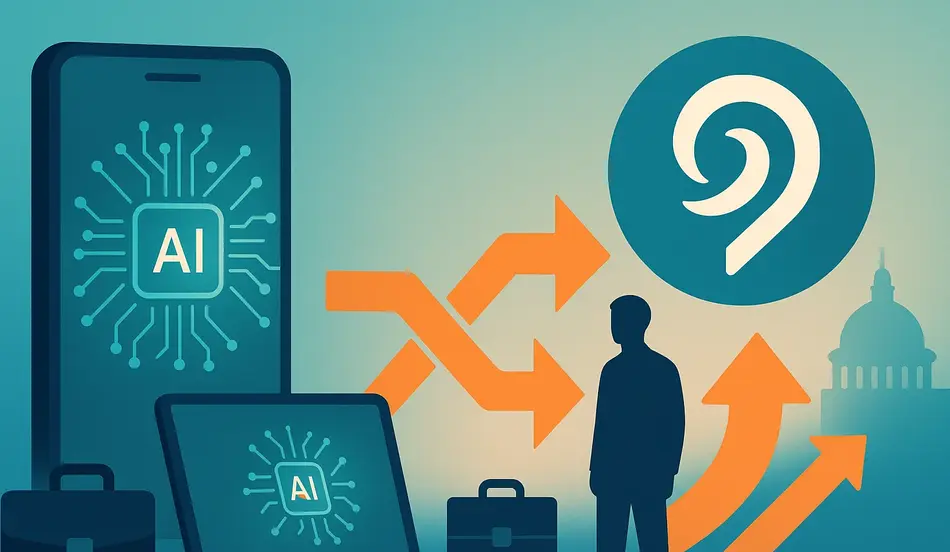Apple, long regarded as one of the most disciplined and cautious companies in Big Tech, is facing mounting pressure to take a bold step in the artificial intelligence race. With rival tech giants rolling out increasingly sophisticated AI models and products, analysts are warning that Apple risks missing the so-called “F1 race” in AI unless it changes course — and soon.
One potential game-changer? A rumored acquisition of AI startup Perplexity, a fast-rising player in conversational search and large-language-model technology. Industry voices suggest that such a deal, combined with a deepened partnership with Google’s Gemini AI, could mark a dramatic pivot for the Cupertino giant.
The AI Gap: Apple’s Internal Limitations
For all its engineering prowess and massive R&D budget, Apple has yet to make a headline-grabbing AI product launch that rivals OpenAI’s ChatGPT, Google’s Gemini, or Anthropic’s Claude. Instead, its AI initiatives have been incremental — enhancing features in iOS, improving Siri’s contextual understanding, and integrating on-device machine learning.
Dan Ives, Managing Director at Wedbush Securities, believes the pace is too slow.
“The reality is there’s a better chance of me making the Ryder Cup team than Apple building world-class AI internally,” Ives quipped. “They have 1.5 billion iPhones out there — the biggest install base in the world — but they can’t afford to wait. Time is ticking.”
Apple’s reluctance to make large acquisitions is well-known. Over the past decade, it has focused on small, strategic deals — often acquiring talent and technology in niche areas without making major headline investments. But the stakes in AI, according to analysts, require something different: speed, scale, and a transformative leap forward.
Why Perplexity?
Perplexity AI, valued at roughly $18–19 billion, has emerged as one of the most talked-about startups in the generative AI space. Founded by Aravind Srinivas — a computer science graduate from India who studied at Berkeley and interned at Google — the company has positioned itself as a serious competitor in AI-powered search and conversational interfaces.
Its flagship product blends traditional search functionality with conversational AI, enabling users to ask complex questions and receive well-sourced, context-rich answers. Analysts say this capability could immediately complement Apple’s ecosystem, powering a next-generation Siri or new search layer across Apple devices.
“Perplexity brings the algorithms, the model, and the developer culture that Apple simply doesn’t have internally,” Ives said. “It’s plug-and-play innovation.”
The Google Gemini Factor
Beyond a potential acquisition, Ives sees another strategic lever: strengthening Apple’s existing relationship with Google. Despite ongoing antitrust scrutiny, Apple continues to rely on Google’s search technology in Safari. A deeper integration of Google’s Gemini AI into Apple devices could offer an interim boost while Perplexity’s technology is integrated.
“To me, this is a two-part strategy,” Ives explained. “One: the Perplexity deal. Two: double down on the Google Gemini partnership. That combination would put Apple back in the AI race in a serious way.”
Such a move would echo recent tech alliances — like Amazon’s investment in Anthropic — in which Big Tech firms have opted to partner or invest in AI leaders rather than building entirely in-house.
A Boardroom Mindset Shift
Historically, Apple’s board has resisted large-scale acquisitions, favoring organic growth and product evolution. But the narrative may be shifting.
“A year ago, the answer was: no way. Six months ago, they were still hesitant. But after some black eyes in the original AI strategy, I believe the view now is that they must do something,” Ives said.
The question is whether the board and senior leadership can align on the urgency — and the size — of such a deal. Apple’s free cash flow remains immense, and last week’s easing of tariff risks with former President Trump removed a notable overhang on investor sentiment. The conditions for a bold move, in other words, are in place.
The Tim Cook Question
Alongside acquisition speculation, some investors have quietly asked whether CEO Tim Cook is the right leader to guide Apple into the AI era. Ives pushes back on the idea that Cook himself is the problem.
“I believe Tim Cook is the right CEO to take Apple into its next phase of growth,” he said. “But underneath him, you need new leadership around innovation. Apple has lost significant talent in recent years, and the DNA of Cupertino, as successful as it’s been, has hit a brick wall when it comes to AI.”
For Ives, the solution is less about replacing Cook and more about bringing in new blood — leaders who can blend Apple’s disciplined product culture with the faster-moving, experimental mindset common in AI startups.
Integration Without Suffocation
If Apple were to buy Perplexity, one of the biggest challenges would be preserving the startup’s culture and pace of innovation. Analysts warn that folding Perplexity too tightly into Apple’s famously secretive, structured corporate environment could dilute the very agility that makes it valuable.
“They have to almost keep Perplexity as a separate division,” Ives argued. “If it gets sucked into the Cupertino machine, you risk killing the golden goose.”
A semi-independent structure, similar to how Facebook handled Instagram in its early years, could allow Perplexity to thrive while leveraging Apple’s scale, resources, and ecosystem integration.
Apple Faces AI Crossroads
Could a Perplexity acquisition spark the company’s next growth phase?
Post a Job Now →A Clock Striking Midnight
For Ives, the message to Apple is urgent: the clock has struck midnight. With AI rapidly reshaping user expectations — from natural language search to multimodal assistants — standing still is not an option.
“Apple is a free cash flow machine. They’ve never done a deal like this before, but it’s time. If they wait, the AI gap will only widen, and others will define the next decade of user interaction,” he warned.
Market Implications
A Perplexity acquisition could have far-reaching effects:
- Competitive Positioning: It would immediately vault Apple into direct competition with OpenAI, Google, and Anthropic in advanced conversational AI.
- Ecosystem Stickiness: An AI-powered Siri and on-device search could deepen iPhone, Mac, and iPad user engagement.
- Regulatory Scrutiny: Given Apple’s size and existing dominance in mobile ecosystems, the deal would likely face intense antitrust review.
- Investor Sentiment: A bold move could energize Apple’s stock, especially among growth-oriented investors concerned about slowing hardware sales.
Risks and Counterarguments
Not everyone is convinced an acquisition is the right path. Critics point out that:
- Large acquisitions in tech often fail to deliver expected synergies.
- Integrating AI models into Apple’s privacy-first approach could be challenging.
- Antitrust scrutiny might delay or derail the transaction.
- Apple’s brand has been built on internally-developed products — outsourcing core innovation could be seen as an admission of weakness.
Yet for supporters of the idea, these risks are outweighed by the urgency of closing the AI gap.
Bottom Line
Apple is at a rare strategic crossroads. For the first time in over a decade, incremental innovation may not be enough. The rise of AI is rewriting the rules of user interaction, and without a bold move, Apple risks becoming a follower in a space where it has long been a leader.
Whether through a Perplexity acquisition, a deeper Google Gemini alliance, or both, the next 4–6 months could define Apple’s trajectory for the next decade.
FAQs
1. Who is the founder of Perplexity AI?
Perplexity was founded by Aravind Srinivas, an Indian-born computer science graduate who studied at the University of California, Berkeley. He previously interned at Google and worked with a team of engineers focused on search and AI systems.
2. Why would Apple want to acquire Perplexity?
Perplexity’s conversational search technology could instantly enhance Siri and other Apple services, providing a leap forward in AI capability without waiting for slower internal development. It would also bring in top AI talent and an agile innovation culture.
3. How much is Perplexity worth?
Industry estimates put Perplexity’s valuation at $18–19 billion, making it one of the highest-valued AI startups globally. A deal of this size would be unprecedented for Apple, which historically avoids large acquisitions.
4. Could Apple face regulatory issues with such a deal?
Yes. Given Apple’s dominant position in mobile hardware and software ecosystems, any major AI acquisition would likely attract scrutiny from U.S. and EU regulators, particularly around competition in search and voice assistant markets.




